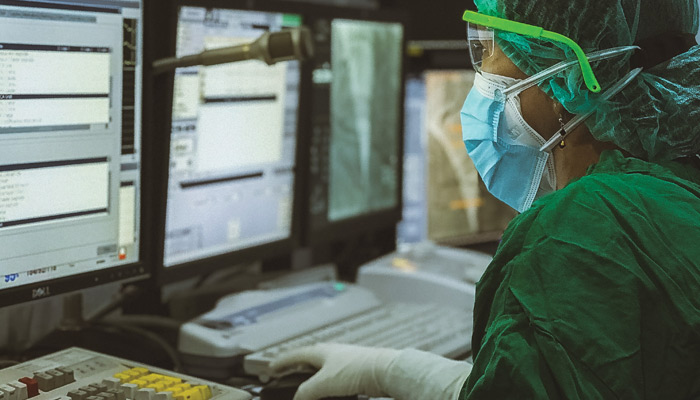
A Physician’s Guide to ViVE23
Tennessee’s Music City was the site of the annual conference uniting influential thought leaders at the forefront of shaping technology-driven healthcare and actively tackling pivotal issues in digital health innovation.
By John R. Dayton, MD
ViVE23 Healthcare Conference
Held in March 2023 in Nashville, Tennessee, the event focused on healthcare information technology (IT) innovation and business transformation. The conference organizers described their goals for the conference:
‘ViVE is the premier, curated event experience for senior and executive digital health decision-makers focusing on the business of healthcare. ViVE merges the leadership of the College of Healthcare Information Management Executives (CHiME) and the marketplace of HLTH to create a technology event focused on the business of transformation in healthcare—bringing together C-suite executives, senior digital health leaders and buyers, health startups, and investors, policymakers, the patient community, and solution providers.’
Unlike most specialty-based conferences physicians usually attend, ViVE is quite different. While all conferences provide education and networking opportunities, ViVE presents a heightened focus on digital health and is run in partnership with the College of Healthcare Information Management Executives (CHIME). As a result, the talks, round tables and company announcements have a strong technology focus related to transforming and modernizing care.
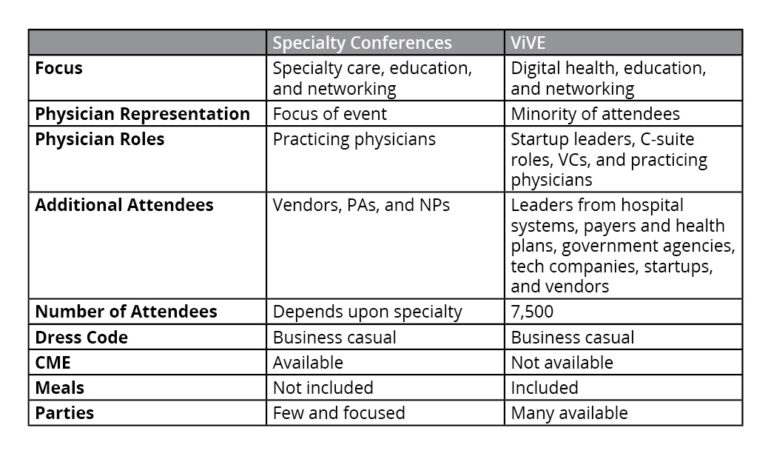
ViVE was held at the Nashville Music City Center right next to the Country Music Hall of Fame and Museum and the Walk of Fame Park. The event itself had a festival feel with several main stages that hosted speakers and panel discussions. The stages were strategically spaced around the great hall along with vendors grouped according to their focus. The “neighborhoods” of tech startups and companies featured areas on digital health, EHRs, interoperability, AI and cybersecurity. I found this to be a clever way of creating networking synergies, which is always important at large events.
The conference featured more than 7,500 attendees, 600 exhibitors and 300 speakers. The speakers included Dr. David Rhew (Microsoft’s Chief Medical Officer), Dr. Angela Shippy (Amazon’s Senior Physician), Julie Yoo (General Partner at Andreessen Horowitz) and Dr. Peter Rasmussen (Cleveland Clinic’s Chief Clinical Officer).
Most of the physicians in attendance do not have traditional clinical roles. Many were speakers and they represented C-suite leadership for technology companies, venture firms, academic institutions and government entities. ViVE prioritizes connecting attendees via a conference app to facilitate meet-ups and through their ‘Funding Founders’ program which connects healthcare startups with investors.
For physicians wanting to maximize their experience, I recommend attending ViVE with a specific purpose and doing research before the event. For example, if you are involved with evaluating and choosing equipment for your hospital or practice, it’s a great idea to see which related vendors will be attending, what talks will focus on your areas of interest and which companies will be announcing and releasing new products. Many of those vendors hold special events and parties at ViVE. As a result, most conference attendees spent the day at the City Center and their nights at the many parties held along the Honky Tonk Highway.
Cutting Edge Medical Education
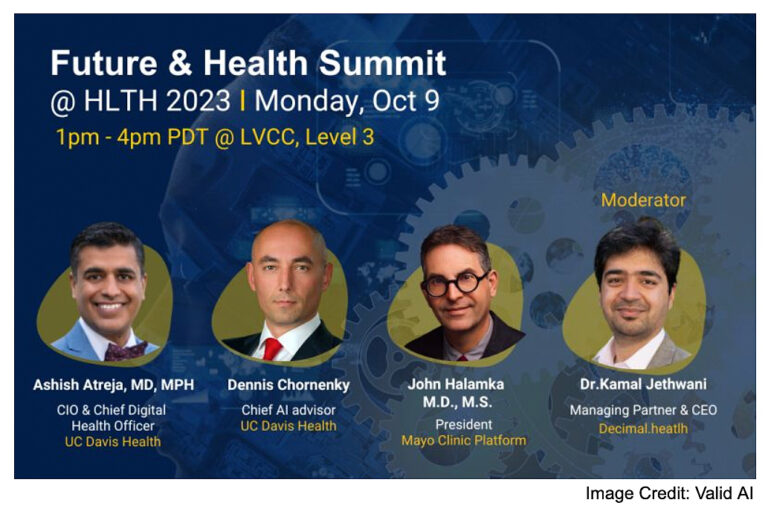
One of the most interesting talks focused on generative AI. Dr. Ashish Atreja and Dennis Chornenky represented UC Davis and led a panel that launched VALID AI (Vision Alignment Learning Implementation Dissemination AI). This collaborative effort was created to focus on best practices, multi-center research, knowledge sharing and clinical support tools for generative AI in healthcare and it involves 30 health systems (including UCSF, Vanderbilt, and Yale) and 6 research partners (including Brain X and the American Heart Association).
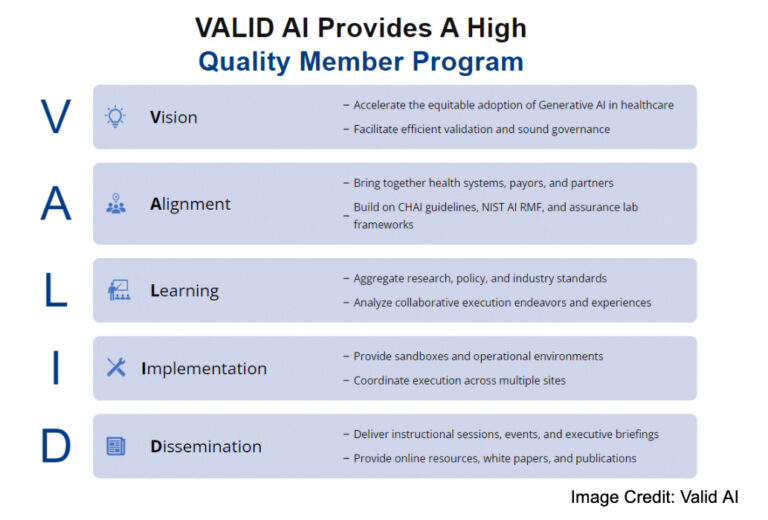
Physician-Focused Companies
Two companies stood out for their focus on physician outreach: Doximity and Zus.
Doximity is a digital platform for physicians and other medical professionals. It provides digital tools to help them practice medicine, communicate with colleagues, earn CME credits and conduct virtual patient visits. Their team at ViVE showcased their latest technology that helps physicians to be more productive so they can spend more time with patients.
Sarah Griego, Director of Professional Services and Telehealth, led focus groups at ViVE demonstrating how their technology could integrate EHRs and clinical work and improve the connection between physicians and patients. Griego highlighted Doximity’s telehealth platform and the Doximity Dialer. She also introduced Docs GPT:
- Doximity Dialer can be used by physicians to follow up on patients without revealing their phone numbers. When physicians call to check on patients, they can choose another number (like a hospital or clinic line) to show up on the patient’s phone instead of their private number (left image below).
- Doximity’s Telehealth platform holds the #1 KLAS rating for video visits— higher than Microsoft Teams and Zoom. It is healthcare-focused, can operate out of EHRs like EPIC and Cerner and prevents a virtual waiting room (right image below).
DocsGPT is a large language model (LLM) that offers writing assistance for healthcare-specific documents like procedure notes, letters of recommendation, patient education and insurance pre-authorizations and appeals. In fact, since DocsGPT is integrated into Doximity’s free e-fax service, those appeals can also be sent to the insurers from DocsGPT.
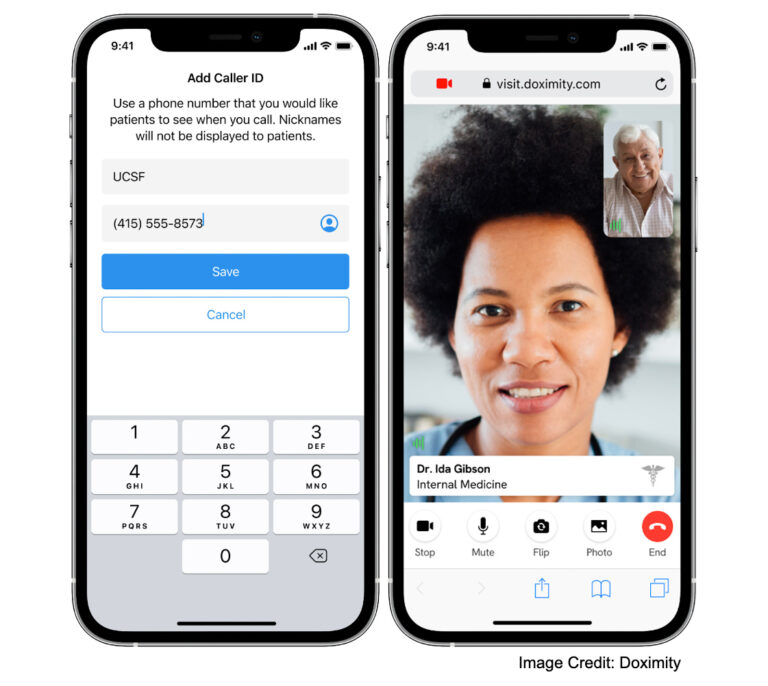
Zus Health is focused on improving healthcare data interoperability. They gather information from multiple sources including hospitals, pharmacies, laboratories and imaging centers to create a complete and up-to-date patient profile. This Zus Aggregated Profile (ZAP) eases patient care transitions, informs treatment decisions and addresses preventive health needs.
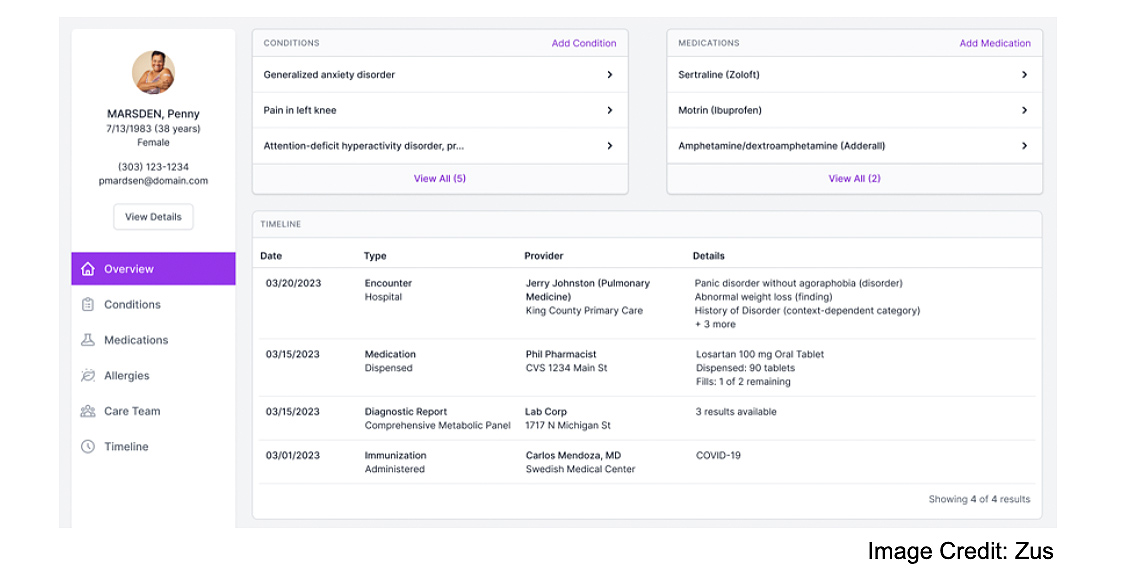
During ViVE, Zus hosted a breakfast for a group of physicians who represented hospitals, clinics, healthcare startups and thought leadership. In a refreshing approach, Zus CEO Jonathan Bush talked about how interoperability would improve care, introduced the ZAP platform and asked the physicians for feedback. He wanted their thoughts on the size of the problem and Zus’s potential solution. He also asked about use cases where the ZAP could be helpful.
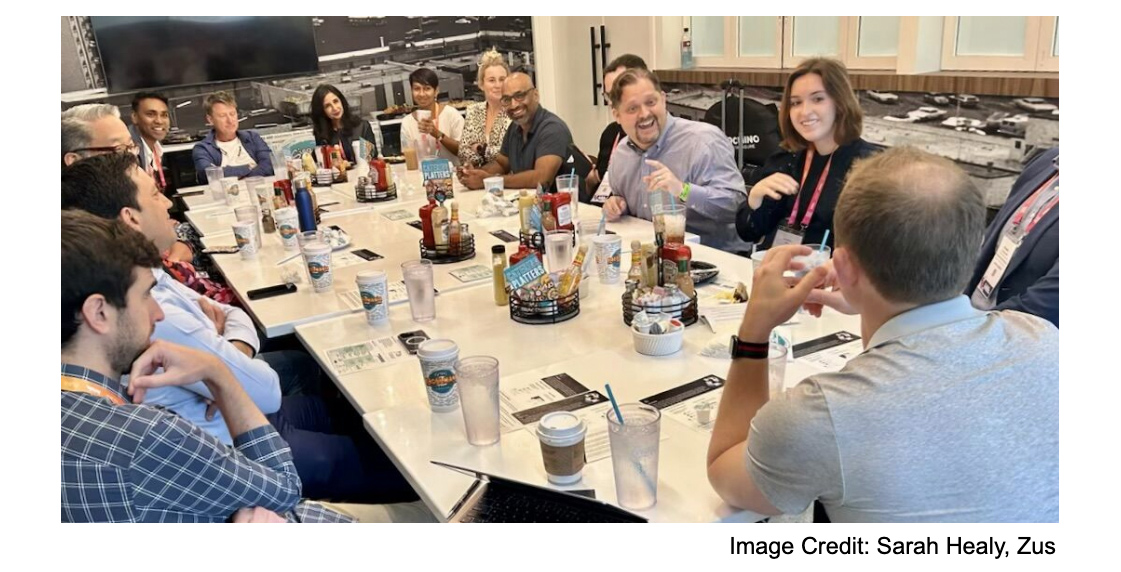
ViVE24
This year’s conference will take place at the end of February in Los Angeles. ViVE has a team focused on curating a unique experience for nurses and patients and I’m working with them on creating a phenomenal physician experience. Leading up to the event, we will release a calendar that has recommended lectures, panels, events and parties that will be interesting to physicians interested in education, innovation, practice resources and non-clinical opportunities. Visit viveevent.com for further information and to register.
John R. Dayton, MD, practices Emergency Medicine with Intermountain Health and Stanford Health Care. He is the first Medical Innovation Fellow with Stanford’s Department of Emergency Medicine where he also completed a Biodesign Faculty Fellowship. Dr. Dayton is interested in digital health, AI, entrepreneurship and medical devices. He is involved with medical innovation as an investor with MedMountain Ventures, as an advisory board member for NODE.health and as a physician advisor for Zus focused on healthcare data interoperability and the physician user experience.




